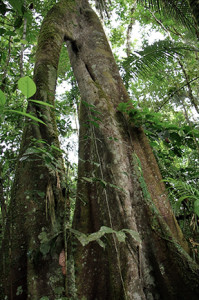By Mike Seager, Yasunidos volunteer
Last week, activists in Ecuador announced they have gathered more than 150,000 signatures of Ecuadorians concerned about the fate of the Yasuní National Park.
 |
| Photo by: Pato Chávez |
The Yasuní National Park is part of the Amazon rainforest, and has been called the most biodiverse location in the Western Hemisphere. An average hectare in Yasuní contains about 650 tree species, more than the total amount of native trees in the continental United States and Canada combined. The park contains 630 species of birds and hundreds of other species of mammals, fish, amphibians and reptiles, and as many as 100,000 insect species, which is the highest estimated diversity per unit area in the world for any plant or animal group.
Activists launched the effort to save this precious forest when the Ecuadoran government announced that a state-run oil company, Petroamazonas, would commence oil exploration and extraction within the Ishpingo-Tambococha-Tiputini section of the Yasuní National Park.
This section of the national park also represents part of the territory of the Taromenane and Tagaeri people, two of the last indigenous tribes living in voluntary isolation in the country, and some of the last remaining in the world. The proposed oil extraction violates the indigenous right to territorial protection as described in the Ecuadorian Constitution. However, loopholes in the legal system have allowed the government to move forward with its plans to explore and exploit oil reserves within the national park, which will impact indigenous territory, and may lead to the contact or demise of these tribes.
The People of Ecuador Can Save the Park
The Yasunidos campaign seeks to gather around 600,000 signatures by April 2014 in order to send a question about the Yasuni drilling proposal to a national referendum. The civic group has led the signature collection campaign throughout the country, organizing public forums and discussions, signature collection outings in various Ecuadorian cities and towns, and has trained volunteers to collect signatures throughout the country. If successful in gathering the 600,000 required signatures, the question will be placed on the ballot and all Ecuadorian citizens will vote whether or not to leave the national park intact. Thus, the country’s citizens would have a direct voice in the issue, and could save the park from oil drilling.
 |
| Photo by: Pato Chávez |
“So far, we are achieving our daily signature collection goal of 3000-5000 per day,” says Jorge Espinosa, one of the Yasunidos volunteers. “We are confident that we are going to collect the 600,000 signatures.”
Yasunidos describes itself on its international blog as a united civil society movement to “demand respect for the human rights of the un-contacted peoples…We demand that our Ancestral and Natural Heritage is not sacrificed and opt for post-oil alternatives. We urge for a truthful and transparent debate about our economic model and our energy base. Also, we demand that the government let us show our disagreement through the legitimate exercise of protest without repression and criminalization.”
The Government Retaliates
On Wednesday December 4, the Ecuadorian government dissolved the Pachamama Foundation, an environmental and human rights organization and former Global Greengrants grantee, that has worked to strengthen sustainable livelihoods, improve education and health with indigenous peoples of the Amazon for more than 16 years. The government alleges that staff from the Pachamama Foundation were involved in “acts of vandalism” at a recent protest.
 |
| Photo by: Pato Chávez |
However, the government has not presented evidence of the foundation’s involvement in the protests. Pachamama has denied the accusations, and argues that the government has chosen to repress the organization’s legitimate right to peaceful dissent. The Pachamama Foundation has been a leading organization in the signature collection campaign and has expressed its disagreement with government oil sector policies.
“This is an example of a sanction being put in place against a legal entity without granting the entity’s basic right to defend itself,” Mario Melo, legal representative of the Pachamama foundation, said. “There was no warning that they had been processed and would receive a sanction. This is a violation of due process, but more importantly, it violates the right that we all have, to express how one feels about a public policy.”
How You Can Help
In order to support the signature collection campaign, and help save this immensely important piece of the Amazon rainforest, please consider donating through the Greengrants webpage here.
Your donation will go directly to the Yasunidos campaign.
- $25 dollars will support one volunteer trip to rural Ecuador to spread the word about the Yasunidos movement, gather signatures, and discuss the importance of protecting the Yasuní National Park.
- $60 dollars will pay for a weekly newspaper advertisement needed to promote the referendum question.
- $100 dollars will enable Yasunidos to print 300 flyers about the campaign.
- $200 dollars will enable Yasunidos to rent an auditorium to hold a forum to raise awareness about the importance of preserving the Yasuní.
- $450 dollars will cover the production of a television advertisement that will encourage the Ecuadorian people to sign in favor of the referendum.
